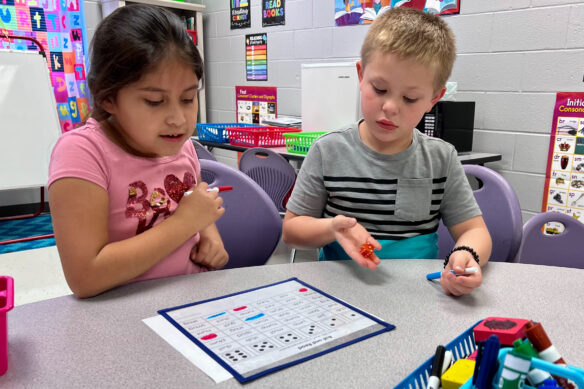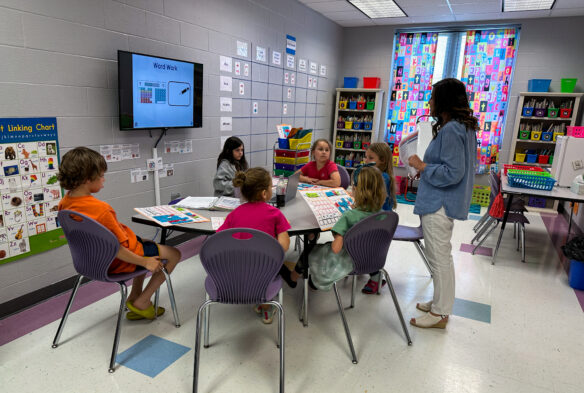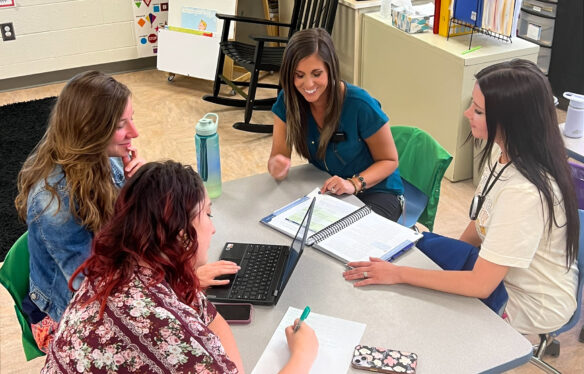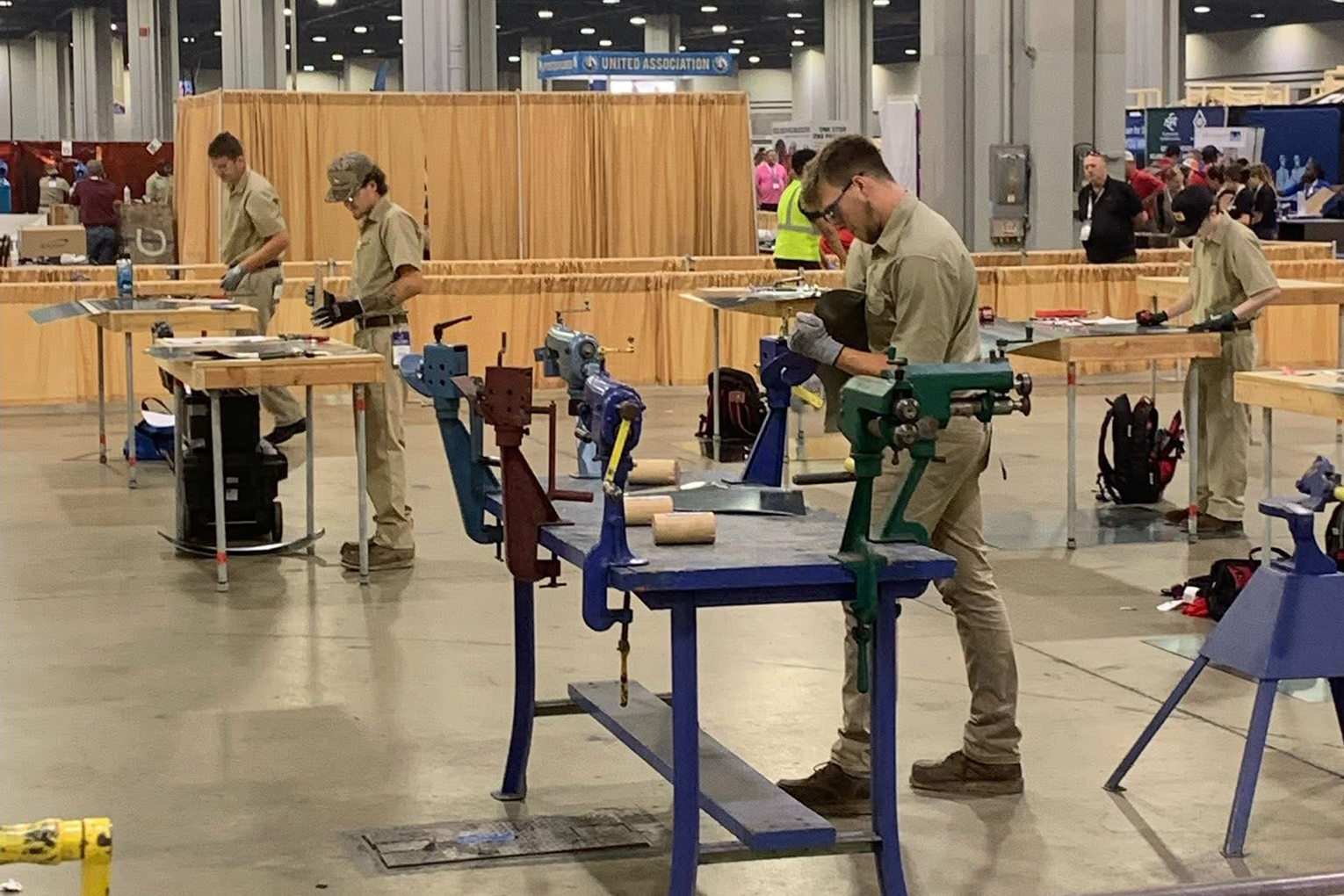
The Kentucky Reading Academies is a comprehensive, no-cost professional learning opportunity open to all K-5 public school educators. The training helps educators understand the science behind how students learn to read. Photo submitted by Ashley Hill.
Principal Jessica McPherson of Gamaliel Elementary (Monroe County) was not satisfied with the thought of even one student not being a proficient reader.
“Ensuring students were reading on grade level by the end of third grade was always on the top of our list of priorities,” she said. “However, when analyzing student data, we realized this growth was not always sustained as students progressed and content became progressively more difficult.”
The Kentucky Reading Academies, which brings the Language Essentials for Teachers of Reading and Spelling (LETRS) professional learning opportunity to educators, was exactly what McPherson was looking for to implement with her team.
The Kentucky Reading Academies seeks to increase reading outcomes for elementary students by providing high-quality professional learning on how students learn to read for K-5 teachers and administrators. In partnership with Lexia Learning, LETRS is an evidence-based training that provides educators with learning grounded in reading research. The research represents a large body of evidence for how students learn to read and write proficiently, why some students struggle and how educators can teach and intervene if necessary.
“The practices we have implemented are all supported by the science of reading and the student growth speaks for itself,” said McPherson. “It really breaks down how students learn to read and strategies you can implement to assist them. It forced us to become more aware of the instruction we were providing for all pillars of literacy. Our students are better readers and writers as a result.”
McPherson and four teachers joined the first cohort of LETRS. After going through the training, Gamaliel Elementary chose to administer the CORE Phonics Survey, a tool for testing phonic skills, to all students in kindergarten through third grade. McPherson said the results were eye-opening.
“We just retested our kindergarten students. At Christmas, the average score on this assessment for our kindergarten students was 77%. This past week, the average score was 90%. Unbelievable growth,” she said.

Through LETRS, teachers gain essential knowledge to master the fundamentals of literacy instruction required to transform student learning and create a more vibrant experience for each and every young reader. Photo submitted by Ashley Hill.
Over 1,800 Kentucky educators and administrators are currently a part of the first cohort of LETRS professional learning. The second cohort will begin in October 2023 and the third cohort will begin in Fall 2024.
The LETRS training is available to educators for free thanks to Elementary and Secondary School Emergency Relief (ESSER) funding and Senate Bill 9 (2022), the Read to Succeed Act. Interested educators can complete the 2023 Phase 2 LETRS Cohort educator registration form, while administrators who are interested in the training can fill out the 2023 Phase 2 LETRS Cohort administrator registration form.
For reading and literacy instruction, there are three “tiers” during the process of learning:
- Tier 1 – Universal or core instruction;
- Tier 2 – Targeted instruction and intervention; and
- Tier 3 – Intensive instruction and intervention.
For a long time across the Commonwealth, the focus for reading intervention has been on Tier 2 or Tier 3 instruction, helping students who have unfinished learning to catch up. LETRS shifts the focus back to Tier 1 and strips learning right down to the basics and improves that instruction.
“It’s not just a focus on phonics; it’s phonics but it’s also knowledge building,” said Ashley Hill, former chief academic officer of Corbin Independent Schools who is now the assistant director of early literacy in the Office of Teaching and Learning at the Kentucky Department of Education (KDE). “Skilled readers have to have some background knowledge. All these experiences make up our ability to comprehend.”
Hill said that while Corbin Independent experienced good scores, they hadn’t done anything differently in reading instruction for a while, and their scores were stagnant. Hill likens Corbin’s focus to shift to Tier 1 support as an awakening.
“We wanted to be proactive instead of reactive,” she said. “Instead of having to remediate our kids, what if we could get it right, right up front. We wouldn’t always be digging ourselves into a hole.”
LETRS breaks down the language learning ingredients to speech sounds, phonics awareness, vocabulary, grammar and comprehension. Hill said the training helps teachers see how brains learn to read and what teachers need to be doing to allow kids’ neurotransmitters to connect the reading concepts.
“I sound like a scientist,” Hill said with a laugh.
Once students completed the MAP Growth assessment, a test given throughout the year to gauge students are on pace with their grade level, in the spring of 2022, the Corbin instructional team was thrilled to see the amount of growth that had taken place in grades K-5.
“A 6% increase in reading equated to about 71 students,” said Hill. “That is about three-and-half classrooms worth of students, more, achieving grade-level mastery of literacy skills than just three years prior, even with a pandemic thrown in the mix.”

More than 1,800 Kentucky educators and administrators are currently completing the two-year LETRS professional learning in Phase 1. Photo submitted by Ashley Hill.
Whitney Cox-Calhoun, a 5th-grade teacher and 14-year educator at Wheatley Elementary (Jefferson County) who is participating in the first cohort of LETRS, initially was nervous about the two-year time commitment for the training. The three different touchpoints in the training helped to dispel those fears. Participants follow along with their course book, through online modules and through group virtual classes.
“Sometimes when you take college courses you get a lot of busy work,” she said. “This is not busy work; it is meaningful work. You can put it immediately into practice.”
Cox-Calhoun found the benchmark assessments included in LETRS to be some of the most beneficial resources, particularly this school year as she had a non-reader in her class.
“To see where her struggles were, it was immediate,” said Cox-Calhoun. “Like oh my gosh, she doesn’t know her long vowels. And then to be able to implement things with her, to help her improve has been rewarding.”
For many of the teachers involved in LETRS, the passion for literacy comes from believing “reading is the gateway” according to Cox-Calhoun. Many students experience shame and lack of self-confidence due to reading struggles.
“It can be a make-or-break-you thing to do. If you can’t read, you see a lot of kids giving up. Then it starts to impact everything they do. It compounds,” she said. “If we catch them early, then we get them farther.”
As a former math teacher, McPherson never felt confident in her ability to lead change when it came to literacy instruction. LETRS gave her the confidence to make literacy decisions at an administrative level.
“I would highly encourage anyone with the opportunity to participate in LETRS to take advantage,” she said. “As a result of this professional learning, I am confident that we will be producing lifelong proficient readers.”




Leave A Comment